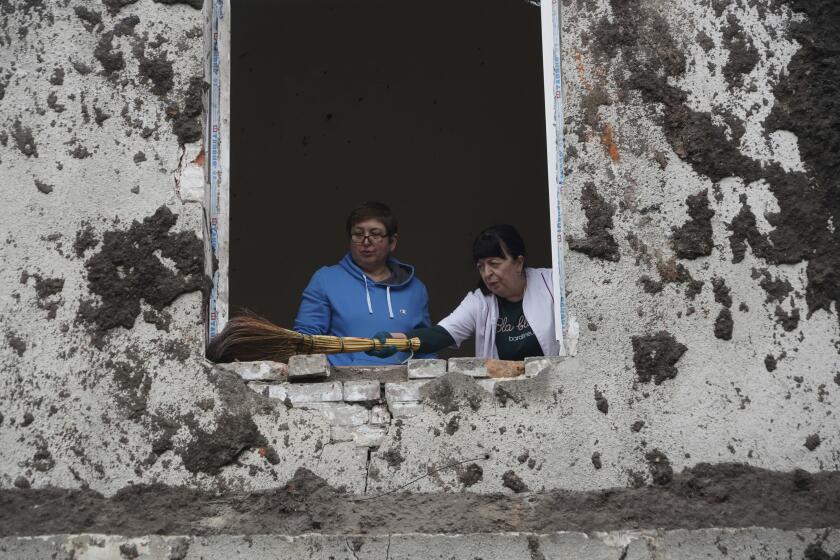Rioting spreads across Tunisia; unrest also reported in Algeria
Protests and strikes driven by unemployment and high food prices continued to sweep across the tightly controlled North African nation of Tunisia on Friday amid police attempts to clamp down on the unrest.
Reports also trickled out about similar unrest in neighboring Algeria, where rioting youths this week burned shops in the capital and clashed with police in several cities.
At the root of the unrest in Tunisia is discontent with the autocratic government’s management of the economy. Thousands of lawyers went on strike Thursday. News reports said Friday that teachers had joined the strikes.
At least two people have been killed in the demonstrations, according to rights group Amnesty International, prompting the organization to condemn what it called “an ongoing crackdown by Tunisian authorities.” Scores of protesters have been detained.
Security forces arrested two bloggers and detained 22-year-old rapper Hamada Ben Amor, who became famous in his homeland with the outspoken song “President, Your People Are Dying,” the news service Agence France-Presse reported.
A journalist in Tunis, the capital, who requests anonymity for security reasons, said in an e-mail interview that clashes continued Friday in the northern farming town of Siliana between security forces and residents. Banks and some government buildings there had been set on fire, the journalist said.
Videos purportedly shot at the demonstrations have surfaced on the Internet. One clip from the town of Sidi Bouzid shows youths clashing with police in the streets as gunshots rattle and plumes of black smoke billow into the air. Others show crowds angrily demonstrating.
Protesters also rioted in the town of Makthar, about 90 miles southwest of Tunis, the journalist said.
Censors appeared to be putting substantial effort into stopping the information flow about the unrest. Pages on Facebook criticizing the government reportedly have been taken down, and some bloggers and journalists covering the protests complain that their accounts on social networking sites have been hacked.
A reporter for the French daily Le Monde was refused entry to Tunisia of Friday, according to the international advocacy group Reporters Without Borders.
The demonstrations began after an unemployed 26-year-old university graduate set himself on fire last month in Sidi Bouzid to protest the police seizure of his vegetable cart. He died of his injuries Tuesday.
Unemployment, especially among college graduates, has been a persistent problem amid Tunisia’s slow economic growth. Although official figures state that 14% of the workforce is idled, analysts believe the real percentage is much higher.
In addition to the unemployment problem, corruption is widely perceived to have worsened in recent years. A secret cable from the U.S. Embassy in Tunis, dated June 23, 2008, and posted on the WikiLeaks website, suggested that President Zine el Abidine ben Ali and his family had a taste for luxury living and always made sure to get a piece of the action.
“Whether it’s cash, services, land, property, or yes, even your yacht, President Ben Ali’s family is rumored to covet it and reportedly gets what it wants,” the dispatch read. “With Tunisians facing rising inflation and high unemployment, the conspicuous displays of wealth and persistent rumors of corruption have added fuel to the fire.”
Still, few believe the upheaval will bring down the regime. Instead, some worry that the government’s continued crackdowns on civil society and secular activists might spur more youths to seek Islamic radicalism as their only outlet.
The unrest appears to have spread to Algeria, where angry youths Wednesday ransacked shops in the capital, hurled stones at police and barricaded roads with burning tires. Nighttime riots also were reported in other parts of the country.
Police officers equipped with batons and tear gas on Friday were guarding mosques and universities in Algiers, the capital, Reuters news agency reported.
The General Union of Algerian Traders and Artisans said consumer prices had increased 20% to 30% in recent days, especially the costs of sugar and oil, according to Agence France-Presse.
Nearly 75% of Algerians are younger than 30, and 20% of the country’s youths are jobless, according to the International Monetary Fund.
Sandels is a special correspondent.
More to Read
Start your day right
Sign up for Essential California for news, features and recommendations from the L.A. Times and beyond in your inbox six days a week.
You may occasionally receive promotional content from the Los Angeles Times.






